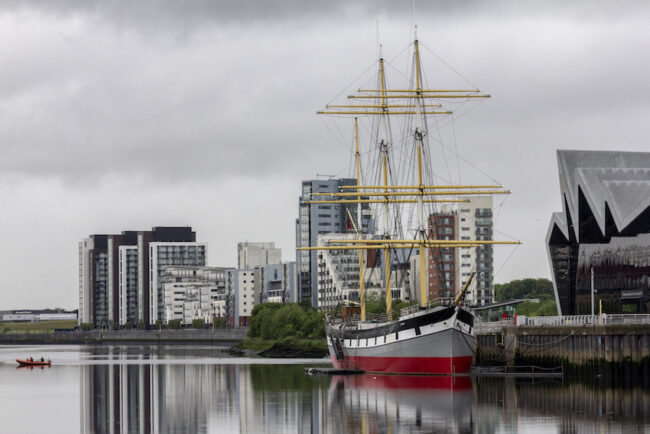Water. We all drink it, but how many of us think it? Eh? Last night Glasgow’s Water Innovation Challenge conference kicked off at the suitably aqueous venue of The Tall Ship.1 The smartly dressed attendees were brought to a dimly lit cabin containing drinks, tables, and PowerPoint presentations.
The conference captain explained that the purpose of the 2.5 day event is to generate and develop ideas that can tackle some of the biggest problems relating to water, by thinking outside of the box. Be that by helping the 2.5 billion people who do not have access to hygienic water, or solving the problems of a Victorian sewage system in the 21st Century.
We’ll report from the event as it progresses, but yesterday it was all about the launch party. We were treated to three key note speakers, all of which worked with water in innovative ways.
First up Minty Donald an artist and lecturer at the University of Glasgow kicked things off by telling us about her “experiments”. My personal favourite was Experiment #2 Water Borrow. This experiment had the following method (to its madness).
[box style=”rounded”]Experiment #2 Water Borrow – Method
Visit as many tributaries to a river as you can. When you reach a tributary ask if you can borrow some water. If you feel that the water has responded “yes”, then gather a bucketful and remember to say “thank you”.[/box]
After completing each experiment Donald would spend some time with her colleagues pondering the interaction. She described her feelings to us incredibly poetically, and philosophised whether water has rights.
Next, we heard from George Ponton from Scottish Water. He opened with a guessing game. If you used all of the Scottish Water water pipes, how many times could you reach Beijing and back? If you don’t want to know the answer look away now. 8! One member of the audience guessed correctly and to her delight she was awarded a bag of Aero Bubbles (gettit?) as a prize.
Ponton went on to provide a motivational speech for the conference participants. Demanding us to “challenge our assumptions” and not to listen to the experts as “they know nothing”. In between the motivational talk, Ponton provided a waterfall of aqua facts. Did you know 600 million litres of water leaks out of Scottish pipes every single day? And it costs more to fix the leaks than it does to put up with the loss of water. And did you know that there is 200% more energy in the waste removed from water, then the energy required to treat it? Great facts, great speech.
Finally, we listened to David Harley from the Scottish Environment Protection Agency (SEPA). Harley focussed on the “interconnectedness of everything”. He spends his time as a Land and Water Manager trying to solve some modern day water problems.
He explained that Scotland has some large residential areas, where all of the excess water washes into the drains and then into nearby rivers. The problem is that the excess water picks up lots of the pollutants, such as oils, metals, and bacteria from the road and concentrates them at one point in the river. This means that there are bodies of water near residential areas with less than ideal levels of pollutants.
“In Germany nobody washes their car in the street,” he told us, “they know that the excess water washes into the drains and causes pollution.” Treating the water from residential areas is really expensive, but doing as the Germans do and reducing the levels of pollutants ourselves is far cheaper.
To finish the evening the participants gathered in their teams to discuss the challenges that they will tackle throughout the conference. In the meantime I did what any good journalist would have done in my position — visited the buffet bar.
Look out for our next report from the Water Innovation Challenge in the next few days. If you want to know more look here, or follow them on Twitter.
References
- A 19th Century Clyde-built sailing boat that is moored outside The Riverside Museum.

